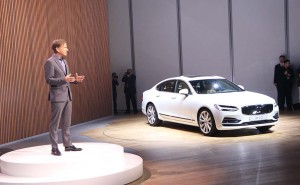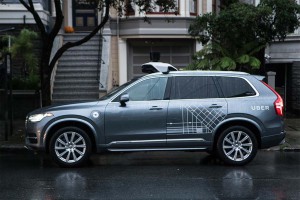
Volvo Chief Executive Hakan Samuelsson said this weekend that an IPO is "an option" for the Swedish automaker.
Volvo Cars, which is now completely owned by a Chinese investor, is considering a stock offering, the company’s top executive told a German-language business magazine.
Hakan Samuelsson, chief executive of Volvo Cars, said a stock market listing is an “option” for the Swedish carmaker, Germany’s Manager Magazin, according to a Reuters dispatch.
Samuelsson told the magazine that there are no current plans for such a move and that it would be up to parent company, Geely Holdings, to decide. Geely, which is based in China, owns 100% of Volvo, which it purchased from the Ford Motor Co. in 2010.
Samuelsson’s remarks follow three consecutive years of sales growth by the Volvo brand as well as the launch of a new product line that has earned favorable reviews in Europe, North America and China.
(Volvo Cars selling second bond offering. For more, Click Here.)
Volvo succeeded in raising fresh capital from bonds last spring and then again last month when it raised $532 million from a group of Swedish institutional investors by selling newly issued preference shares that would have “an immaterial dilutive effect” on Geely’s 100% ownership.
“Today’s move is another step toward Volvo Cars’ long expressed ambition to act as a listed company,” Volvo said in a statement in December.
During the North American International Auto Show, executives from Volvo Cars stressed the company has been given a great deal of independence by Geely.
Volvo Cars record sales in 2016, increased 6.2% compared with 2015, to 534,332 cars, underlining the breadth and depth of the company’s ongoing global transformation.
The record 2016 was driven by solid growth in all major sales regions, including double-digit increases in China and the United States and growth in Western Europe, the company noted when in its final sales report for the 2016 calendar year.
(Click Here for more about Volvo tailoring its City Safety System for rural roads.)
In the United States, Volvo gained market share in 2016, growing 18.1%, making it one of the fastest growing premium brands in a broadly flat market. Total sales for the year amounted to 82,726 cars, with the Volvo XC90 and XC60 leading sales performances.
Volvo’s largest market in 2016 was China, with total sales of 90,930 cars, an increase of 11.5%. The best-selling models in the world’s largest car market were the locally-produced Volvo XC60 and S60L premium sedan.
Sales in Western Europe increased 4.1%, boosted by strong performances in key markets such as Germany, the United Kingdom, France and Italy. Total sales in the region amounted to 206,144 cars.
Sales of the new top-of-the-line 90 series cars were the main growth driver globally, led by the Volvo XC90 large premium SUV for which sales rose 125% versus 2015, highlighting the success of the company’s new design and engineering direction and boding well for the future as more new models are revealed in coming years.
During 2016, Volvo continued construction work on a new $500 million manufacturing plant in South Carolina, its first in the United States. The plant will build new cars based on its modular Scalable Product Architecture (SPA) and will initially employ up to 2,000 people. The new plant in South Carolina underlines Volvo’s long term and strong commitment to the United States.
(To see more about Uber relocating its self-driving Volvos, Click Here.)
Volvo Cars also unveiled a new manufacturing strategy for China in which production capacity will be increased and China will be developed in a global manufacturing export hub. Its top-of-the-range S90 cars will be built in Daqing in northern China, while existing and future 60-series cars will be built in Chengdu.

